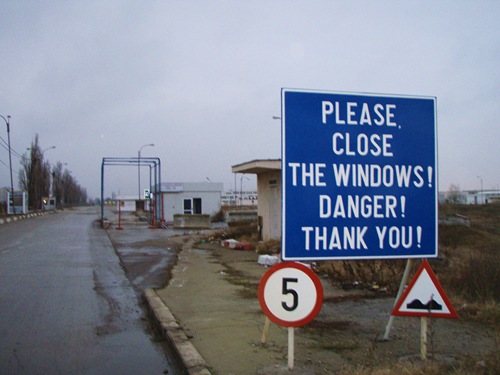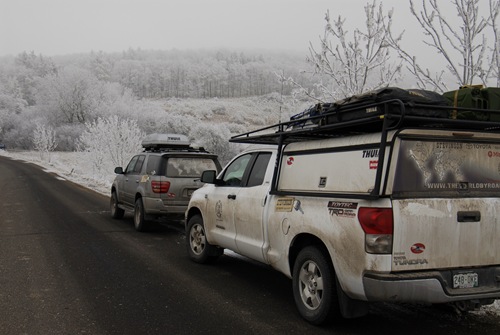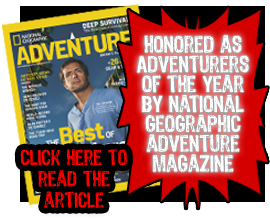These days it is smooth sailing for TWBR. Smooth sailing in many ways. We are finally in the heart of Europe… although at the moment we are off on the Scandinavia artery… and with that comes great road surfaces. In fact, in Germany, they pride themselves on having some of the best road surfaces in the world. The road surfaces are so go that on the Autobahn, the German word for motorway encompassing all such roads in the country, there is no speed limit. Of course, authorities recommend that you keep you vehicle under 130 kph (82 mph) but if I had a new Porsche, BMW or Mercedes, I would relish in the freedom the autobahn affords and as you may have guessed, many people do just that. Do not worry, the Toyotas have a governor on them so we were not able to totally risk our lives seeing how fast they can go, but I can say with a cheeky grin that a fully loaded Tundra drives exceptionally smooth at 170 kph (105 mph)… I think I read that in a magazine somewhere.
It has also been smooth sailing in terms of border crossings. I am working right now on calculating just how much time we spent sitting at borders on the expedition to date. We have had to sit at borders whilst waiting for paperwork, waiting for our turn in a one car per hour crossing and in many cases simply waiting for them to open the border in the first place. Now that we are in Europe, driving from country to country it is almost like driving from state to state back home. Here in the European Union, there is an open border policy and you are able to freely travel among EU countries by car without stopping and without any passport control. The restrictions on international travel in Europe were made easier in part by the formation of the EU. When we crossed into Bulgaria, the first European country on our trip, we had to stop, go through passport control, get the vehicles inspected and ensure the customs officials that all of our paperwork was in order, but it was all very organized and simple. There was no passport control leaving Bulgaria, but we still had to stop for a brief check upon entering its EU neighbor to the north, Romania. This was also the case with entering Hungary.

No one was at the Romanian border to tell us if filming out of the window was safe
When we left Budapest, we fully expected to have to stop again or border formalities before we entered Slovakia and the Czech Republic. These border stops we anticipated would be far from inconvenient as all of the EU crossings to date have amounted to no more than 20 minutes of our time put together. At this point in the expedition, we were so used to stopping at borders and explaining what we were doing that it actually felt very strange to see signs indicating that we had suddenly left Hungary and had mistakenly entered Austria. In any other region in the world, this would probably be a fairly significant problem, but not in this part of Europe. We had made a wrong turn and found ourselves in Austria instead of Slovakia, although it was easy enough to find our way back to the Slovakian border. We were again surprised to find the border control post at the Slovakian/Austrian border completely abandoned and were waived through without stopping at the Czech frontier by the one lone police officer there. It just so happens that if we had left Hungary and drove to Slovakia and the Czech Republic the day before, the empty border offices would have been occupied and we would have had to stop for customs control. The day we crossed into Slovakia and the Czech Republic, December 21, 2007, was they day that these countries, along with a handful of others in Europe, had become party to the Schengen agreement.

All is quiet on the German border outside of Dresden
The Schengen Agreement basically creates a single external border around its member states thus eliminating the need for internal borders. The agreement makes traveling between these countries hassle free with the exception of trying to figure out if you should fill up your tank before you cross the border because the price of petrol is $1 more per gallon in the next country. Even sea border crossings are greatly simplified. On the ferry from Germany to Denmark, the only indication that you were on an international ferry crossing was the long line of Danes outside the on board duty free shop. The duty free shop opens for a grand total of about 25 minutes enabling people to stock up on booze and cigarettes without having to fork over the 30+ percent taxes they encounter on these items in Scandinavia. All in all, it has been nice not having to worry about what is going to happen at the next international border we cross. We are saving some pages in our rapidly filling passports and do not have to worry about what time the border closes for the evening. Hopefully the ease at which we are able to cross through the next 10 or so countries will not make us soft, because Africa looms on the horizon and I would hedge a bet that things work a little differently down there.
